Storm Proxies
Storm Proxies is a small-scale proxy service provider which, at first glance, might not look like it has much to offer - but the reality could be a little different.
The company's 200,000 proxies can't match the millions you'll get from the top competition, for instance. Geo-targeting is mostly limited to very wide regions (USA, EU, Worldwide; US city coverage is Cheyenne, Los Angeles and New York.) Support is limited, and you only get 24 hours to try out the service.
But on the plus side, Storm Proxies isn't trying to pretend it's something it isn't, a one-stop solution to all your proxy needs. It does have worthwhile products to offer, including rotating dedicated and residential HTTP/HTTPS proxies, and dedicated proxies targeted at social media, ticket, sneaker and other sites. And great value pricing could make it a smart choice for small-time scrapers, social media managers and anyone else on an extreme budget.
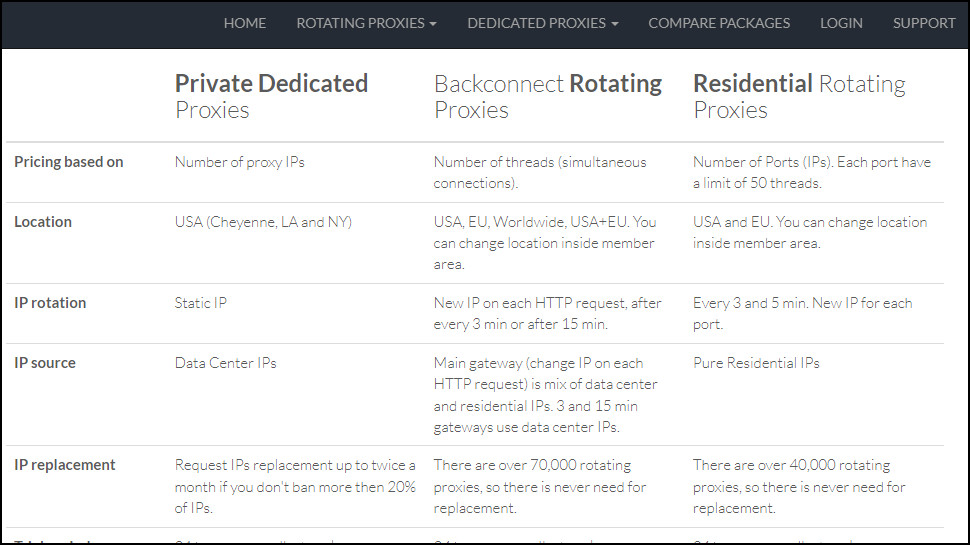
Plans and Pricing
Storm Proxies offers three types of proxies. These are rotating residential proxies, private dedicated proxies which offer data center IPs, and backconnect rotating proxies which have a mix of data center and residential IPs.
Each of these proxies have multiple plans, all of which offer unlimited bandwidth. Instead of capping data transfers, Storm Proxies limit their accounts by other factors.
For instance, the private dedicated proxies limit accounts on the number of IPs. The smallest plan offers 5 proxies for $10/month, while the top most one offers 400 proxies for $400/month. All of these plans can run 100 concurrent threads.
Backconnect rotating proxies are priced on the number of simultaneous connections. For $39/month you can run 40 simultaneous connections all the way up to $97 a month for 150 simultaneous connections.
Finally, there’s the rotating residential proxies with prices based on the number of ports. Each port can run a maximum of 50 simultaneous connections. These plans start at $50/month for 5 ports and go all the way up to 50 ports for $300/month.
Other variations include proxy rotation times (there are 3, 5 and 15 minute options available.) The service also offers smaller and larger plans as well as specialized plans for specific targets. For example, you can get 5 private Twitter proxies for only $15 a month.
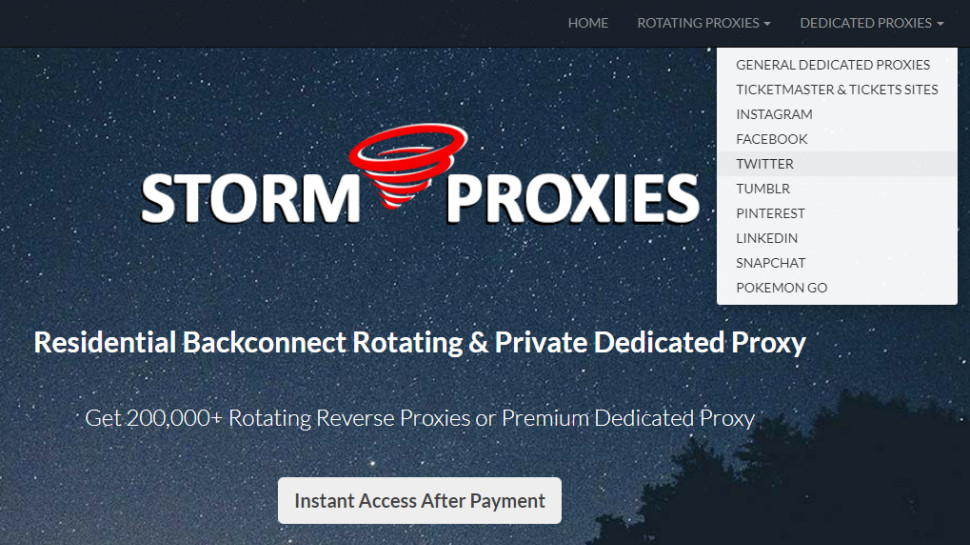
Signing up
Storm Proxies does its best to point you in the right product direction. When we chose a regular residential IP rotating plan, for instance, the site warned 'these proxies are not for scraping search engines', and pointed us to its dedicated rotating proxy page, instead.
Find the product you need, and Storm Proxies goes to unusual lengths to verify your details, asking for your name, email address and even phone number (you'll be sent a verification code by text, so this has to be correct.)
Providing this level of personal detail always makes us uneasy. Still, if it means fewer customers abusing the service, and so fewer IP bans, there's a benefit for everyone.
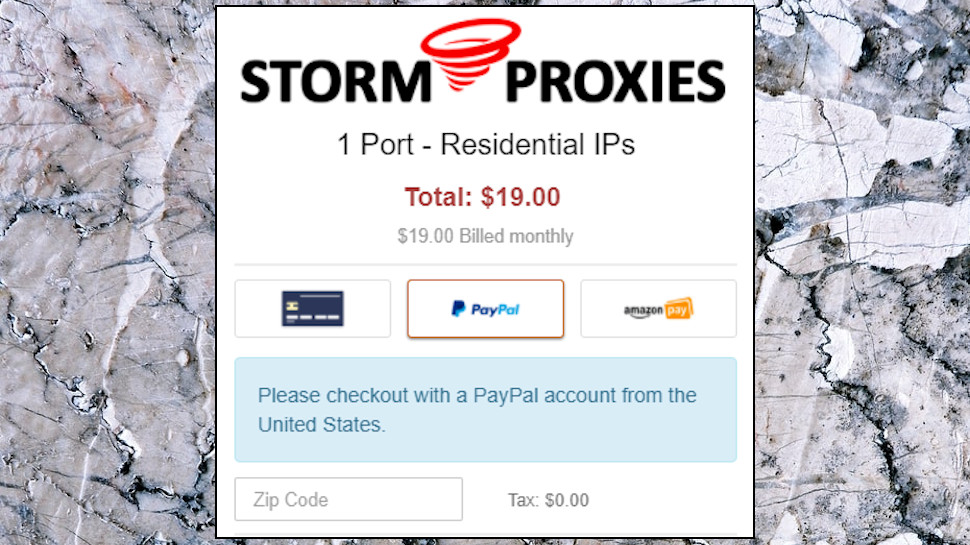
Payment is supported by card, PayPal and Amazon Pay, but handing over your cash is still a little more difficult than it needs to be. The payment form assumes you're in the US, and rather than asking you to enter any PayPal account address, demands you use a US PayPal account and enter a zip code. There's a quick fix - choose your own country from the menu top-right - but this is still an odd issue we've not seen anywhere else.
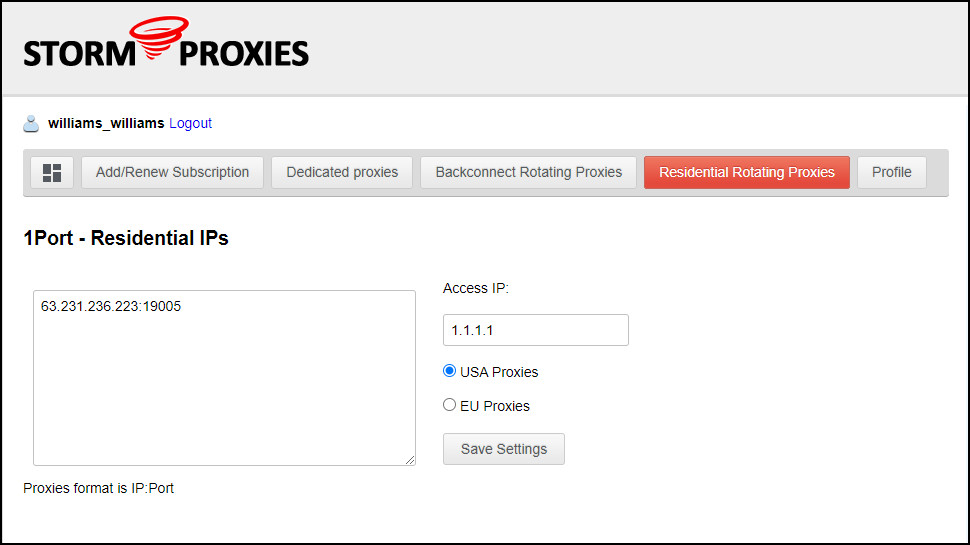
Interface
Storm Proxies' web dashboard is just about as simple a setup as we've ever seen. An opening page displays your plan, renewal date and a Cancel link; and (for instance) your Residential Rotating Proxies page lists your proxies in IP:Port form, with a single access IP and a US or EU location selector.
This is implemented in the most basic way possible, too. You'd hope the Access IP would set itself to your current IP by default, right? But no: it's set to 1.1.1.1, and you must change it manually.
And, well, if you've got a list of 100 proxies, the least the dashboard could do is give you a Save As CSV or TXT, yes? Uh, no: it's just a plain textbox, you'll have to copy and paste to transfer your proxy details anywhere else.
Individual plans have their own technical limitations, too. As we mentioned, residential rotating proxies only support IP authentication, for instance, and you're only allowed one access IP, a hassle if you need to access the service from more than one network or device. Squid Proxies supports up to ten IPs, for more convenient.
Our residential plan had no control over IP rotation time, either: it's fixed at 5 minutes.
Using Storm Proxies
Although our Storm Proxies dashboard looked like it had been thrown together by someone in an afternoon (and that's with time for a couple of lengthy coffee breaks), there's a plus side: you've almost nothing to learn.
If you've some proxy experience, you'll figure out what to do at a glance. Here's the list of proxies; it's in IP:port format, so I don't have to worry about usernames and passwords; I just need to put my real IP in the Access IP box, copy and paste my proxies and I'm ready to go.
Even if you're a newbie, you won't waste time wandering around looking for advanced settings, because there aren't any.
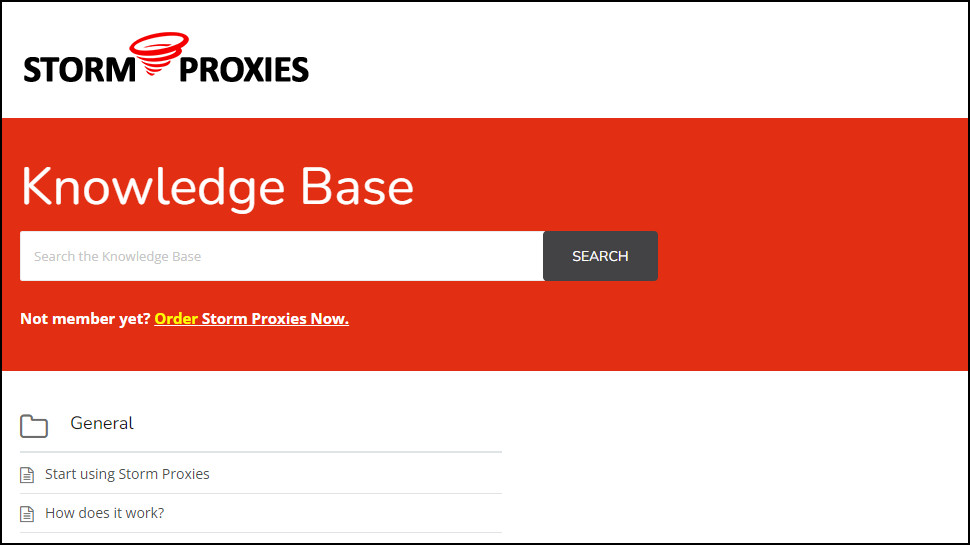
If you do run into any difficulties, Storm Proxies has a help site with advice. It's also basic in the extreme, although some articles do highlight details which aren't easy to spot elsewhere.
For example, the 'What gateway to choose for rotating proxies?' article recommends that 'the number of threads for harvester should not exceed 25% number of threads allowed for your account', not something you might have guessed otherwise.
If you don't find an answer in the knowledgebase, you can contact Smart Proxies support directly. The company claims to offer 24/7 Premium Support', but there's no live chat, and its own stats aren't that impressive: the company says '45% of emails are replied [sic] under one hour', but it may take up to 24 hours to reach all the rest. Not a disaster, but not what we'd call 'Premium', either.
Final Verdict
Storm Proxies won't win over anyone with the length of its feature list, and some of its issues, such as the inability to target specific countries outside the US, make it unusable for many proxy-related tasks.
But if you can live within its limits, Storm Proxies gives you a capable basic service from just a few dollars a month, and that's just fine with us. Go give it a try.
We've also highlighted the best proxy and best VPN
0 comments:
Post a Comment